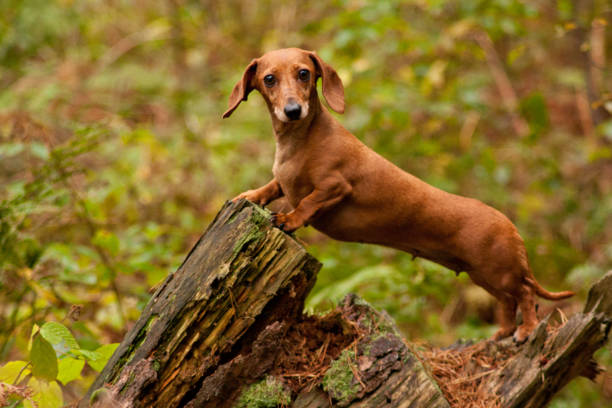Dachshunds:

Dachshunds, also affectionately known as “wiener dogs” due to their distinctive long bodies and short legs, are spirited and playful dogs with a unique personality and appearance.
Temperament
Dachshunds are bold and curious, originally bred to hunt badgers, so they naturally possess a keen sense of adventure. They can be quite stubborn and independent, reflecting their breeding as determined hunters. Despite their small size, they have a loud bark and can be quite protective, making them excellent watchdogs. Dachshunds are known for being loyal to their families, but they can be wary around strangers and other dogs. This breed tends to bond closely with one or two people, and they can be quite playful and affectionate with their favorite humans.
Lifespan
Dachshunds generally have a long lifespan, with many living between 12 to 16 years. Proper care, a well-managed diet, regular exercise, and routine veterinary check-ups contribute to their longevity.
Care
Caring for a Dachshund requires understanding their specific needs:
- Diet: Feed them high-quality dog food that is appropriate for their age, size, and activity level. It’s important to monitor their food intake as they are prone to obesity, which can exacerbate spinal issues common in the breed.
- Exercise: Although they are energetic, their exercise needs can be met with moderate activities to avoid overstraining their backs. Daily walks and play sessions should be enough to keep them healthy and happy.
- Health Care: Dachshunds are particularly prone to spinal problems, specifically intervertebral disc disease (IVDD), due to their long spines. Keeping them at a healthy weight and avoiding activities that strain their spine, like jumping on and off high surfaces, is crucial. Regular veterinary visits are important for early detection and management of health issues.
- Grooming: Depending on their coat type (smooth, long-haired, or wire-haired), grooming needs vary. Smooth-coated Dachshunds need occasional brushing, while long-haired and wire-haired types require more frequent grooming to avoid matting and tangles.
- Training and Socialization: Early and consistent training using positive reinforcement is essential, especially given their stubborn nature. Socialization helps mitigate their tendency to be shy or aggressive toward strangers.
- Environment: Dachshunds do well in both apartments and houses with yards, as long as they have enough space to move around and explore safely. They appreciate having access to cozy spots where they can burrow, as burrowing is a natural behavior for them.
By addressing these aspects of their care, Dachshunds can be delightful companions, offering affection and entertainment to their owners while maintaining their distinctive charm and character.